
Baron Hotham, of South Dalton in the County of York, is a title in the Peerage of Ireland. It was created in 1797 for the naval commander Admiral William Hotham, with remainder to the heirs male of his father. Hotham was the third son of Sir Beaumont Hotham, 7th Baronet, of Scorborough, and in 1811 he also succeeded his nephew as eleventh Baronet. Lord Hotham never married and on his death in 1813 he was succeeded in both titles by his younger brother Beaumont, the second Baron and twelfth Baronet. He had previously represented Wigan in the House of Commons.
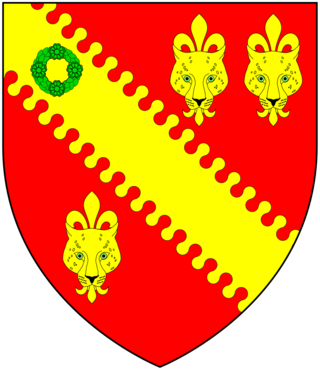
Baron Tennyson, of Aldworth in the County of Sussex and of Freshwater in the Isle of Wight, is a title in the Peerage of the United Kingdom. It was created in 1884 for the poet Alfred Tennyson. His son, the second Baron, served as Governor-General of Australia, and his grandson, the third Baron, as a captain for the English cricket team. On the death in 2006 of the latter's younger son, the fifth Baron, the line of the eldest son of the first Baron failed. The title was inherited by the late Baron's second cousin once removed, the sixth and present holder of the peerage. He is the great-grandson of Hon. Lionel Tennyson, second son of the first Baron.
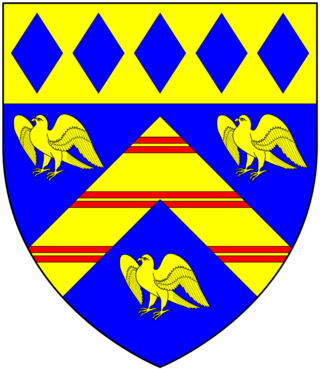
Baron Roborough, of Maristow in the County of Devon, is a title in the Peerage of the United Kingdom. It was created on 24 January 1938 for Sir Henry Lopes, 4th Baronet. He had earlier represented Grantham, Lincolnshire, in Parliament as a Conservative. The Baronetcy, of Maristow House in the County of Devon, had been created in the Baronetage of the United Kingdom on 1 November 1805 for Manasseh Masseh Lopes, a member of a wealthy family of Portuguese Jewish origin, with special remainder to his nephew Ralph Franco, son of his sister Maria. Manasseh Masseh Lopes converted to Christianity in 1802, and later represented Evesham, in Worcestershire, Barnstaple in Devon, and Westbury in Somerset, in Parliament. However, in 1819 he was twice convicted of bribing the voters in both Barnstaple and Grampound in order to be elected to Parliament, and was sentenced to imprisonment and heavy fines. He was also unseated by the House of Commons, but after his release from prison he nonetheless got elected for Westbury, a pocket borough which he controlled to a great extent.

Sir John Henry Eugen Vanderstegen Millington-Drake, was a British diplomat.
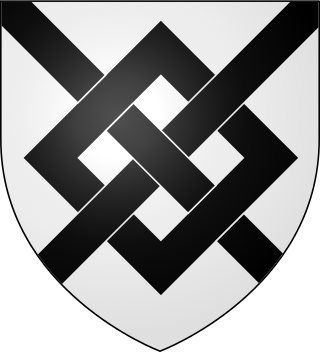
The Tollemache family is an English noble family, originally from Suffolk. The family's surname is pronounced TOL-mash.

Henry Leonard Campbell Brassey, 1st Baron Brassey of Apethorpe, DL, of Apethorpe Hall in Northamptonshire, was a British Conservative Party politician.
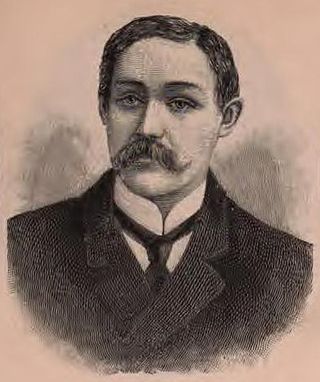
Henry Yarde Buller Lopes, 1st Baron Roborough, known as Sir Henry Lopes, 4th Baronet from 1908 to 1938, of Maristow in the parish of Tamerton Foliot, Devon, was a British Conservative Party politician.
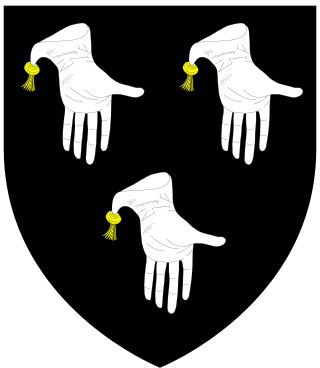
The Barttelot Baronetcy, of Stopham in the County of West Sussex, is a title in the Baronetage of the United Kingdom.
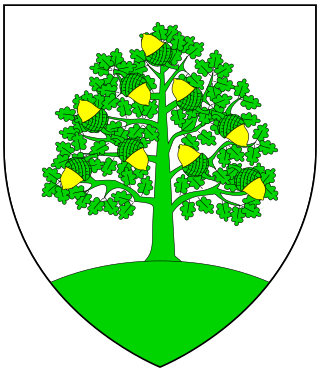
The Wood, later Page Wood Baronetcy, of Hatherley House in the County of Gloucester, is a title in the Baronetage of the United Kingdom. It was created on 16 December 1837 for Matthew Wood, Lord Mayor of London from 1815 to 1817 and Whig Member of Parliament for the City of London from 1817 to 1843. The fifth Baronet assumed the additional surname of Page. Two other members of the family have also gained distinction. William Wood, 1st Baron Hatherley, Lord High Chancellor of Great Britain from 1868 to 1872, was the second son of the first Baronet while Field Marshal Sir Evelyn Wood was the fifth son of the second Baronet. Also, Katharine O'Shea, known for her relationship with Charles Stewart Parnell, was the daughter of the second Baronet. The theosophist and political activist Annie Besant, was the great-granddaughter of the 1st Baronet's father.

Sir Lopes Massey Lopes, 3rd Baronet, PC, known as Massey Franco until 1831, of Maristow in the parish of Tamerton Foliot, Devon, was a British Conservative politician and agriculturalist.
The Baker, later Sherston-Baker Baronetcy, of Dunstable House in Richmond in the County of Surrey, is a title in the Baronetage of Great Britain. It was created on 14 May 1796 for Robert Baker, in honour of him raising and maintaining a cavalry regiment of 500 men styled "The Richmond Rangers" for King George III. He was succeeded by his son, the second Baronet. He was a vice-admiral in the Royal Navy. The fourth Baronet was a Recorder of Helston and of Barnstaple and Bideford and a County Court judge. The fifth Baronet assumed by deed poll the additional surname of Sherston in 1923. The Baker family was settled in the Westcountry several centuries before the creation of the baronetcy. A version of the arms used by the Baker baronets is displayed on the mural monument in Dunchideock Church in Devon of Aaron Baker (1620–1683) of Bowhay in the parish of Exminster, Devon, first President of the Madras Presidency.

The Dyke Baronetcy, of Horeham in the County of Sussex, is a title in the Baronetage of England. It was created on 3 March 1677 for Thomas Dyke, Commissioner of Public Accounts and Member of Parliament for Sussex and East Grinstead. The 2nd Baronet married Anne Hart, daughter and heiress of Percival Hart. In 1836 the 5th Baronet unsuccessfully claimed the barony of Braye, of which peerage he was a co-heir through the Hart family. The 7th Baronet was a successful Conservative politician. Percyvall Hart Dyke (1872–1952), grandson of Reverend Thomas Hart Dyke, second son of the 5th Baronet, was a Colonel in the Indian Army. His son Trevor Hart Dyke was a Brigadier in the Queen's Royal Regiment. David Hart Dyke, son of Reverend Eric Hart Dyke, son of the aforementioned Colonel Percyvall Hart Dyke, is a retired Captain in the Royal Navy and commanded HMS Coventry during the Falklands War. His daughter Miranda Hart is a well known writer, comedian, and actress.

Alexander Nelson Hood, 4th Viscount Bridport, 7th Duke of Bronte, known as Alex Bridport, is a British investment banker, resident in Geneva, Switzerland.

Sir Robert Bacon, 3rd Baronet of Redgrave (1574–1655) was an English landowner.

Sir Edmund Bacon, 6th Baronet, of Garboldisham, Norfolk, was a British politician who sat in the House of Commons between 1710 and 1741.

Arthur Wellington Alexander Nelson Hood, 2nd Viscount Bridport CB of Guernsey, Channel Islands, was a British Army officer.

The Wilson, later Maryon-Wilson Baronetcy, of East Borne in the County of Sussex, was a title in the Baronetage of England. It was created on 4 March 1661 for William Wilson, of East Borne Place in the parish of Eastbourne, Sussex, a descendant of Sir Thomas Wilson (1524-1581), Knight, Secretary of State to Queen Elizabeth I. The sixth Baronet sat as Member of Parliament for Sussex. The eleventh Baronet assumed the additional surname of Maryon in 1899. The title became extinct on the death of the thirteenth Baronet in 1978.
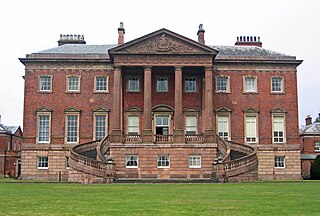
There have been two baronetcies created for persons with the surname Leicester, both in the Baronetage of England. The fifth Baronet of the second creation was raised to the peerage as Baron de Tabley in 1826. Both the barony and the two baronetcies are now extinct.
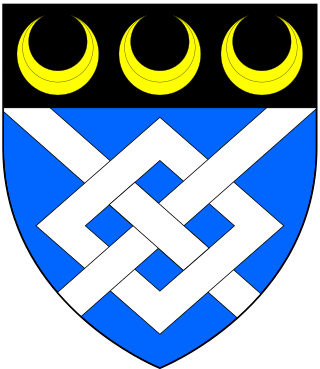
Sir Alexander Hood, 2nd Baronet, was an English Conservative Party politician.
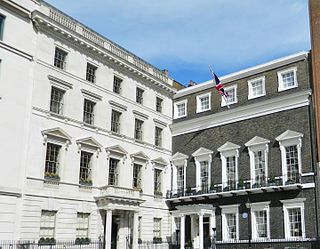
5, St James's Square is a Grade II* listed historic townhouse in London, England, built 1748–51 by William Wentworth, 2nd Earl of Strafford (1722–1791) to the design of Matthew Brettingham the Elder. It remained the London residence of the descendants of his sister until after 1968, and in 1984 was the site of the "Libyan Peoples' Bureau" from which shots were fired which caused the murder of Yvonne Fletcher.



















